Great things can arise from our worst moments. Our actions now will dictate what happens to the future of the food world. In the wake of COVID-19, people in our community are turning into innovators and humanitarians, creating projects to help the greater food good.
Even though food has been the main thing getting me through this quarantine, no sourdough bread baking, Instagram live cooking tutorial, or cake delivery will change the fact that times are fucking hard and about to get harder. A recent article published in the New York Times projected that in the United States, up to 75% of independent restaurants could close in the upcoming months. That’s a scary, scary stat. So, I then take that info and enter into the social distancing rabbit hole, where my mind starts uncontrollably racing like one of those inflatable car dealership tube men in a tornado — my skydancing arms flailing to their wacky, waving demise as I think about what the future may hold for Buenos Aires restaurants, cooks, and the thousands of workers who are the backbone of the food and hospitality industry. Then there’s me… will I need to find a new profession? And before I know it, it’s 4 am, and I’m hovered in front of the refrigerator in my underwear gnawing on a chunk of insomnia cheese*, wondering when will be the next time I’ll actually be able to give another human being a hug. (*It’s just regular cheese, but since I eat it when I’m anxious and can’t sleep, I’ve renamed it accordingly).
By now I’m used to these feelings of COVID doom and gloom. After 45 days of riding on this emotional cuarentena rollercoaster, I know that these waves of terror will eventually level out. I’ll give myself a good slap across the face, and force my brain to focus on more productive thoughts. Because what truly gives me hope and motivation while I’m locked down in my Chacarita apartment, is when I’m inspired by others. I’m talking about innovative projects, the community coming together, and people taking action to help one another. In my most optimistic moments, I dream this pandemic will be like hitting a giant reset life button and could be a positive change for the food world.
So, today, I’m going to concentrate on this, because there are a lot of people out there doing great things, and that is what’s important to remember when times get tough. Here are just some of the ways the Buenos Aires food community has kept my spirits high.
Red Cuarentena Solidaria
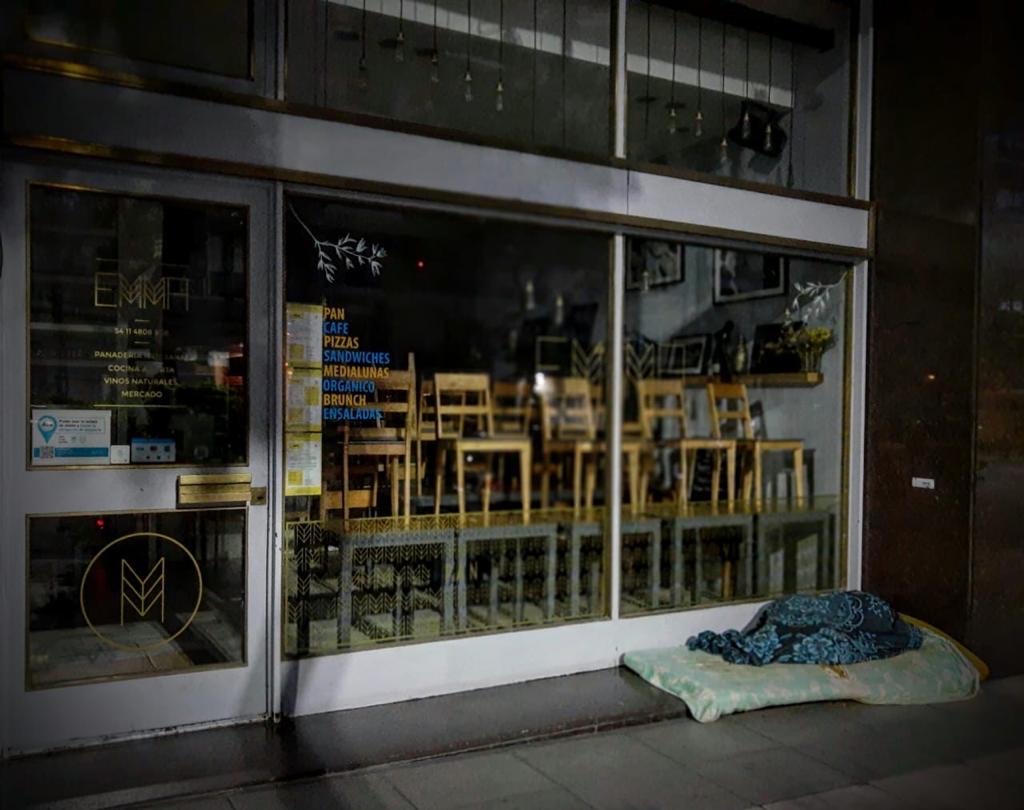
While I am quarantining in my comfortable apartment – cooking, drinking, and obsessing over The Last Dance and 90s Chicago Bulls nostalgia – I can’t help but think about my own privilege and those who are much less fortunate, stuck in abusive or detrimental living situations. Red Cuarentena Solidaria, which was created in just days, started at Emma Panadería in Recoleta, when owners Pia Suarez and Felipe González saw the only people left on the street during the lockdown were those with nowhere else to go. This vulnerable population could no longer depend on a community setting for their basic needs, so Emma Panadería began providing them with bread and homemade meals. Like-minded friends joined the cause — like psychologist Fabián Maero — and Red Cuarentena Solidaria was born. RCS collects donations like food, books, toiletries, blankets, and warm clothing to help prepare the homeless for the cold winter months to come. Over the past few weeks, more and more collaborators have stepped in to help, and now there are “solidarity locations” across 25 different neighborhoods in BA. Chile has also replicated the concept.
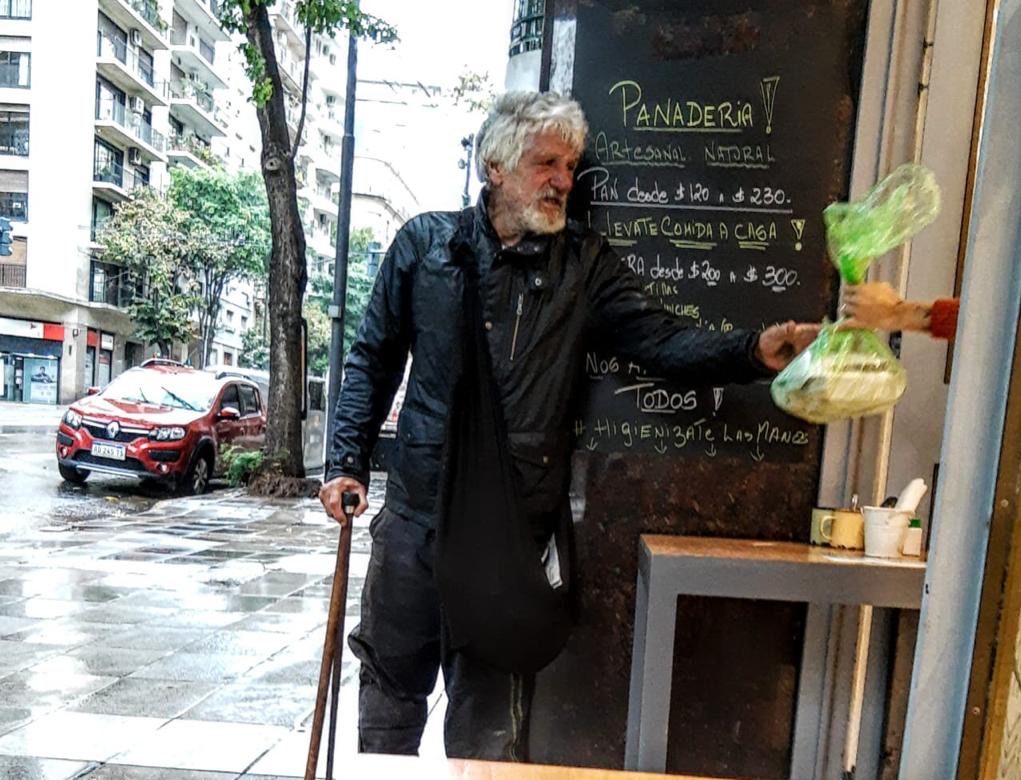
How can we help? If you own an essential business currently open, you can set up a donation box outside your store. If you’d like to donate, check out Red Cuarentena Solidaria’s website for more information on drop off locations.
A Call For Solidarity

A few restaurants are using their kitchens — which are at low occupancy due to the decrease in client demand — to give back. Grupo Mezcla, who are behind Orno, Casa Cavia, and La Panadería de Pablo, will be preparing 350 viandas everyday for the next month to health care and high risk essential workers during the pandemic. They are donating and distributing these hot foods to hospitals, comedores, and local police and security officers in their neighborhood. “The idea is that we all collaborate and give back to those who most need it,” founder and creative director Lupe García says. “Thinking that we can make a lentil stew in Casa Cavia’s kitchen is a symbol of the times that we are living.” If their project works, they have plans to open a larger donation space to make 600 meals per day.
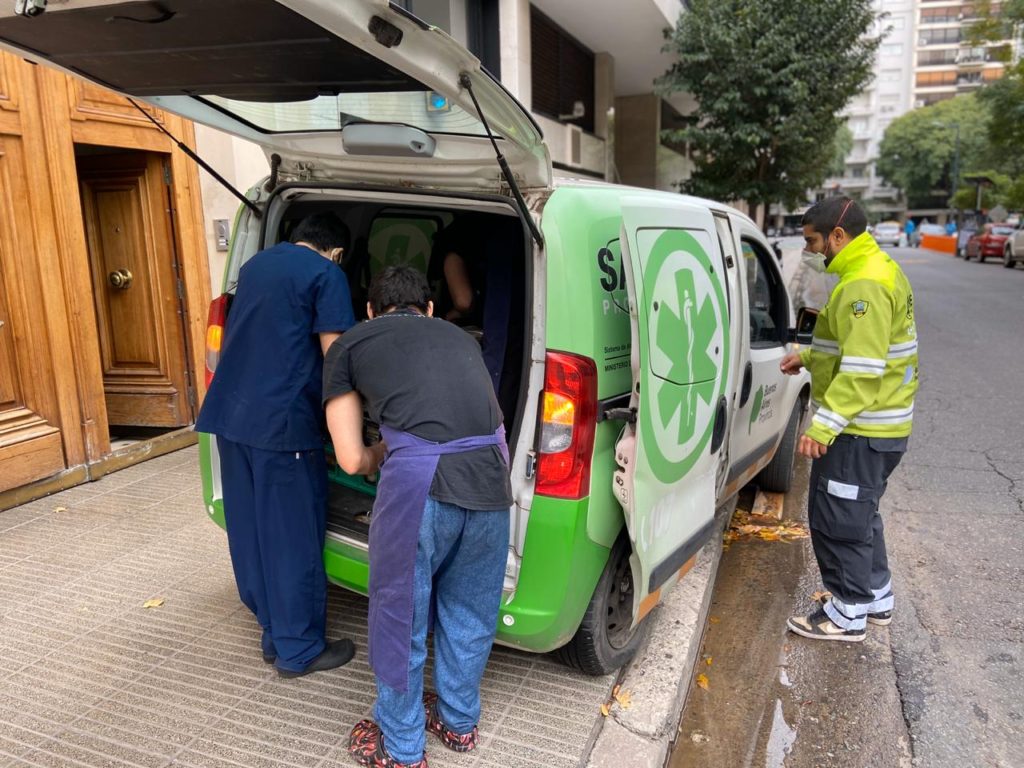
The Petersen chefs teamed up with various NGOs and organizations, like Fundación Manos Abiertas, Fundación Sí, Red Solidaria, UADE, and La Rural to provide over 300 meals per day to comedores across the city.
Burger Joint in Palermo is giving all health care workers a 50% discount on their “Fuck Corona” green breaded burger, and Co-Pain boulangerie is donating the leftover bread at the end of the day to local parishes and the emergency room at Hospital Durand. Restaurants like Café San Juan and Narda Comedor are also providing food for hospitals.
Relief Kitchens are popping up across the United States, mostly with the help of corporate, individual, and government funding, to feed out of work hospitality workers. Chef José Andrés is also leading the fight against hunger with his charity World Central Kitchen, a nonprofit that sets up field kitchens amidst a global crisis. Although the economic strains make it difficult to replicate these models in Argentina, let’s hope for more grassroots projects to pop up and give a hand.
Restaurant Innovation
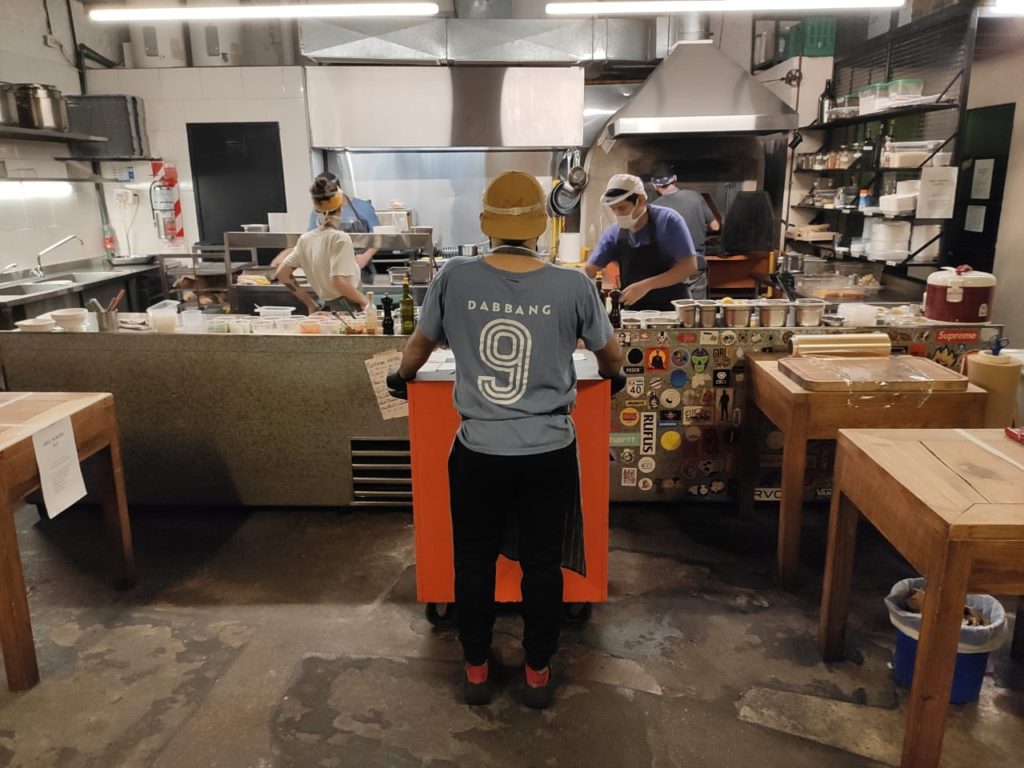
When the government announced that the lockdown would be extended until an unforeseeable future, many restaurants had to suddenly shift focus, finding a temporary remedy, which mostly meant takeaway and delivery services. But how long will restaurants be able to stay afloat and pay staff salaries solely on that model? Is that sustainable? Is it safe? And let’s be honest, most food we eat in a restaurant doesn’t exactly travel well. Will these restaurants readjust to make delivery-friendly food that clients actually want/need? These are some of the questions many restaurants are asking as they find their own way to adapt to new concepts and pivot their business models to cater to the current demand. I’ll write more in detail later in another blog post about specific restaurants, but for now, I’ll leave you with some projects that are off to a good start:
- Whenever friends visit from abroad, I always recommend a good old fashioned Palermo double-double: Gran Dabbang for dinner, Proper for dessert. And now this culinary dream team has joined forces for a special quarantine pop up, featuring fan favorites like fainá and burrata, curries, and Proper’s world-famous flan de dulce de leche. Not only is Comedor Diario making comforting lunch specials and selling cookie and chipá dough, but it now is an almacén and dispensa, like a mini Masticar market, with some of the country’s best products from yogurt to olive oil to almond milk. La Carnicería has also transformed their modern parrilla into an almacén, teaming up with their produce proveedores like organic farm La Anunciación to sell fruits and vegetables. They created “combo packs” to provide La Carni style asados at home, including items like their grass-fed beef (from owner German Sitz’s farm in La Pampa), chorizos, provoleta, Atelier Fuerza sourdough, great wines, and veggies. Clients can choose to order the asado already cooked, or it can be delivered ready to cook at home. Café San Juan is making economic dishes every day for just $220 pesos. La Carnicería, along with brother fat boy resto Niño Gordo, also sends premade dishes al vacio, vacuum-sealed to easily (and more safely) cook or freeze. I love Kyopo’s pre-made easy pack meals too: Bulgogi (beef), jeyuk (pork), dakgalbi (chicken), all vacuum sealed to eat right away or freeze. They also sell kimchi, which is crucial for the fridge, because kimchi fried rice with an egg on top is my meal savior. For a special occasion, there’s restaurants like Tegui, which gives diners the fine dining experience at home. And Julia Restaurante, who manages to recreate their beautiful dishes in delivery form.

- Sometimes you only need a few extra ingredients and condiments to really give life to a meal. I’m all about stocking up wisely, buying certain staple items and reworking leftovers to make killer dishes. Vegan/vegetarian Sampa started a Quarantine Club, selling packs that include items like chimichurri, cookie dough, pesto, eggplant escabeche, and various chutneys and sauces. Georgie’s are delivering tacos kits that include all the corn tortillas and fixings to make tacos at home while La Alacena is selling their delicious pastas to cook in your kitchen. And I don’t know about you, but my freezer would feel totally naked if it wasn’t stocked with Sheikob’s Bagels.
- The first weeks confined inside my apartment weren’t easy, but I found comfort and normalcy in one morning routine: Eating sourdough toast. A few unordinary and “essential” neighborhood bakeries remained open since the beginning of the strict “shelter in place” order from the government. These shops like Emma Panadería, Atelier Fuerza, and Salvaje Bakery, are owned by young Argentine bakers (who also happen to be pioneers in the city’s sourdough bread movement), and share a vision: To provide a sense of joy, unity, and stability in the form of bread.
And a food for thought: The food industry and local communities are going to need to work together more than ever before: Restaurants will need to listen to customers and adapt to their needs, and in return, we support our local businesses. But we can’t forget about our neighborhood spots — bars, cafés, restaurants, and barrio favorites that perhaps don’t have a social media presence or the means to be visible on delivery apps.
Mi Barrio Chat
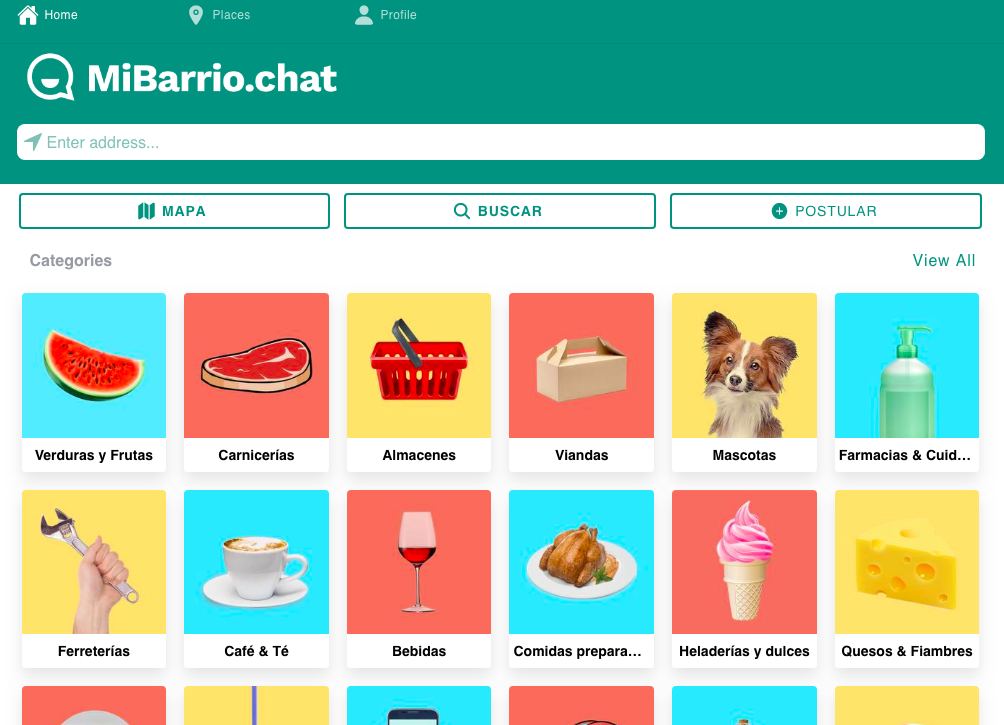
Built in just 72 hours, the Mi Barrio Chat website collects the Whatsapp numbers from small businesses from across the city and connects them with the general public, without any Lex Luthor third-party apps getting in the way. Unlike delivery services like the Rappi, Glovo, UberEats, and PedidosYa (who are benefiting from the crisis on the backs of restaurants and delivery workers who have little safety net), Mi Barrio Chat is a completely free service that truly focuses on supporting the barrio and close-knit community. Their database is growing every day, and a great resource to check out what businesses are open and providing services. (If you have a business, make sure to add it to the website).
Also check out Tugou.App!
Home Cooks Be Cooking
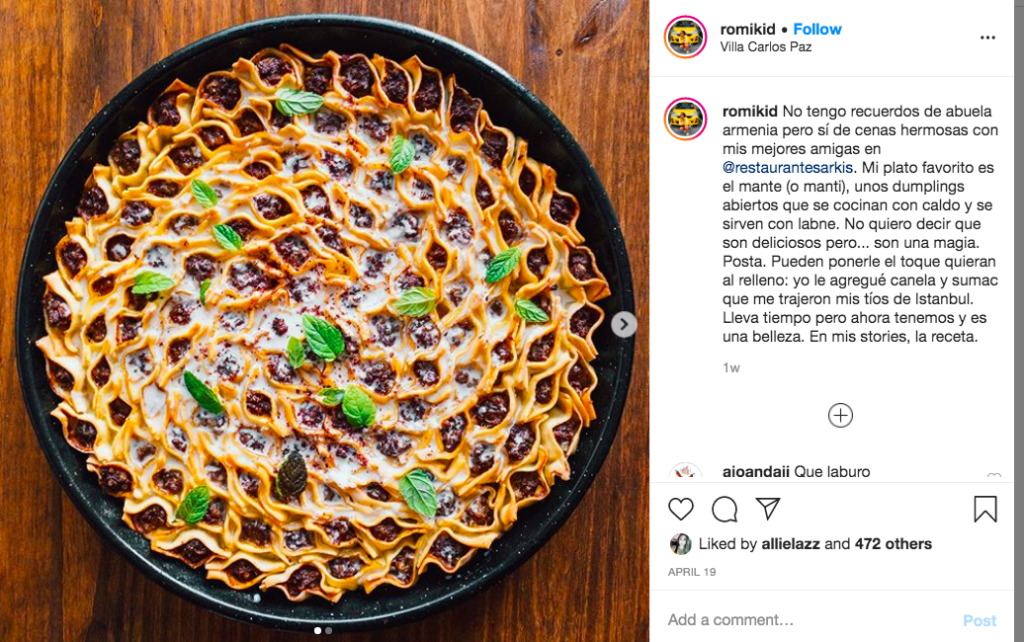
In the four-episode Netflix series Cooked, journalist and acclaimed author Michael Pollan made the argument that even though North Americans are obsessed with food culture, they are cooking less than ever before at home. He attributes this to lack of time, loss of skills and confidence, and basically says most people don’t have the ganas to cook. But alas, in the Coronavirus era, home cooks are returning to the kitchen unlike ever before, flour and baking powder have flown off the supermarket shelves, and people are finding hope and tranquility in their sourdough bread starters and sexy budines. (Cuz I don’t know ’bout you, but a sweet bready loaf sure turns me on.)
There’s nothing like that pure sense of gratification when I cook something that is insanely delicious. Of course, I have to share it with all of you on social media! Otherwise, it never happened. I do not have children, but I imagine this is the same proud feeling of accomplishment that a parent encounters when their baby says her first words or takes his first steps. Chefs are helping home cooks in this movement too. Instagram live and stories are bumping with cooking tutorials, recipe ideas, and Q&A on the basics of cooking. In Argentina, Narda Lepes is answering specific cooking questions on Instagram and Twitter; Julieta Oriolo shows how she makes her incredible La Alacena pastas at home; Lele Cristobal is posting a recipe video a day; as is Donato de Santis; Mecha Solis is answering basic cooking questions; and home cook Romi Viola is making incredible step by step recipes, with a special focus on Bon Appetit-inspired content.
**If you know of any other resourceful, innovative projects or acts of kindness that have come about in wake of the Coronavirus outbreak, please let me know about it!!**
Carolina says
your back!!! never leave us again ally
G says
I don”t know if this count’s as innovative or resourceful, but we now live in a world where La Mezzetta offers delivery. So, there’s that.
forkyou says
That counts.
Maria Sol says
Que buena data! Y que interesante ver y saber que nuestros emprendedores pueden hacerle frente a situaciones inesperadas reconvirtiéndose tan rápidamente





big daddy says
i wanna eat cheese with u at 4 in the morning
Fede says
Insomnia cheese!!! jajajajajjaa
Marcos says
sos muy genia